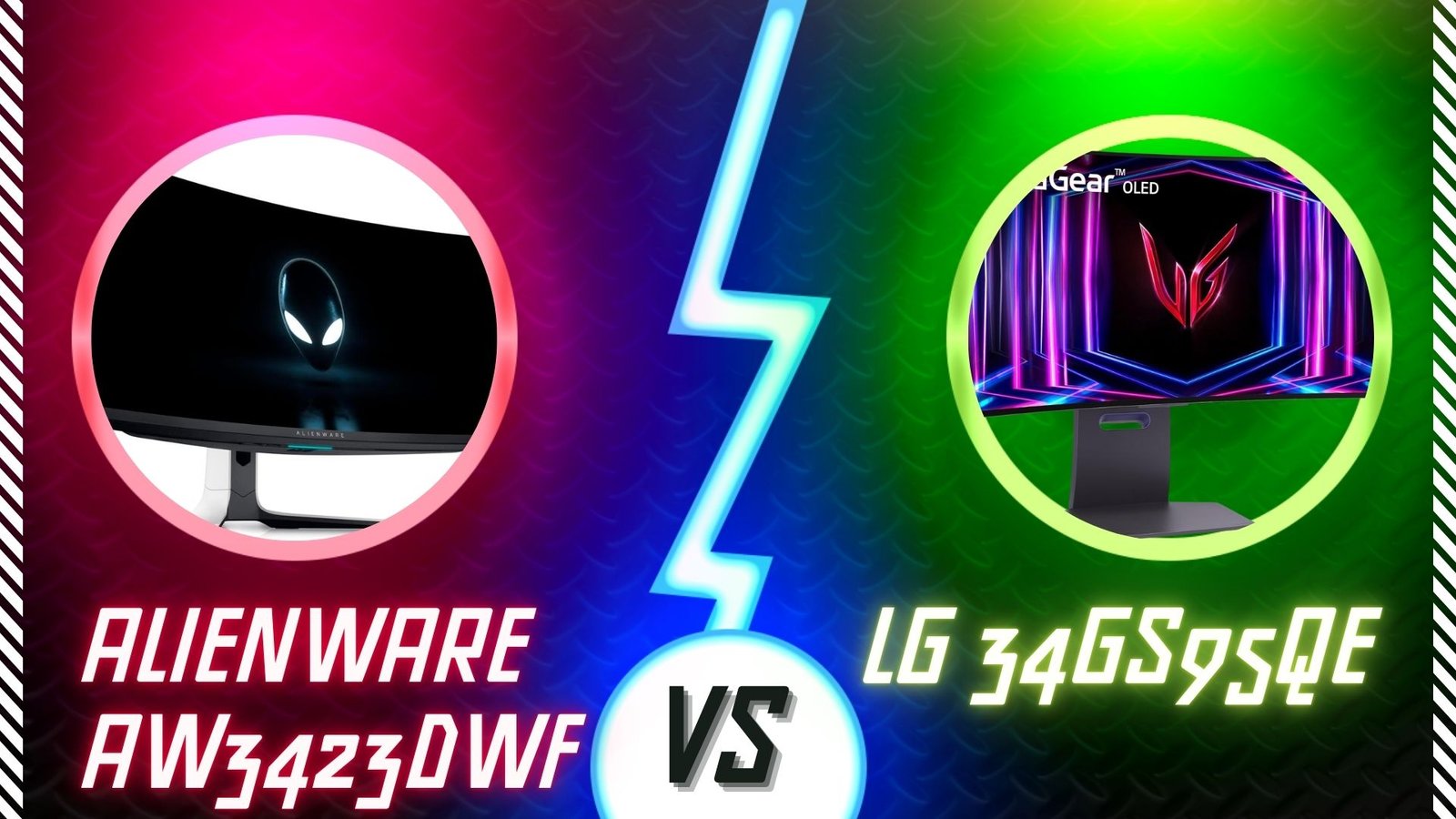Detailed comparison: Alienware AW3423DWF vs LG 34GS95QE. Discover specs, performance, and which curved gaming monitor wins. Read now!
Table of Contents
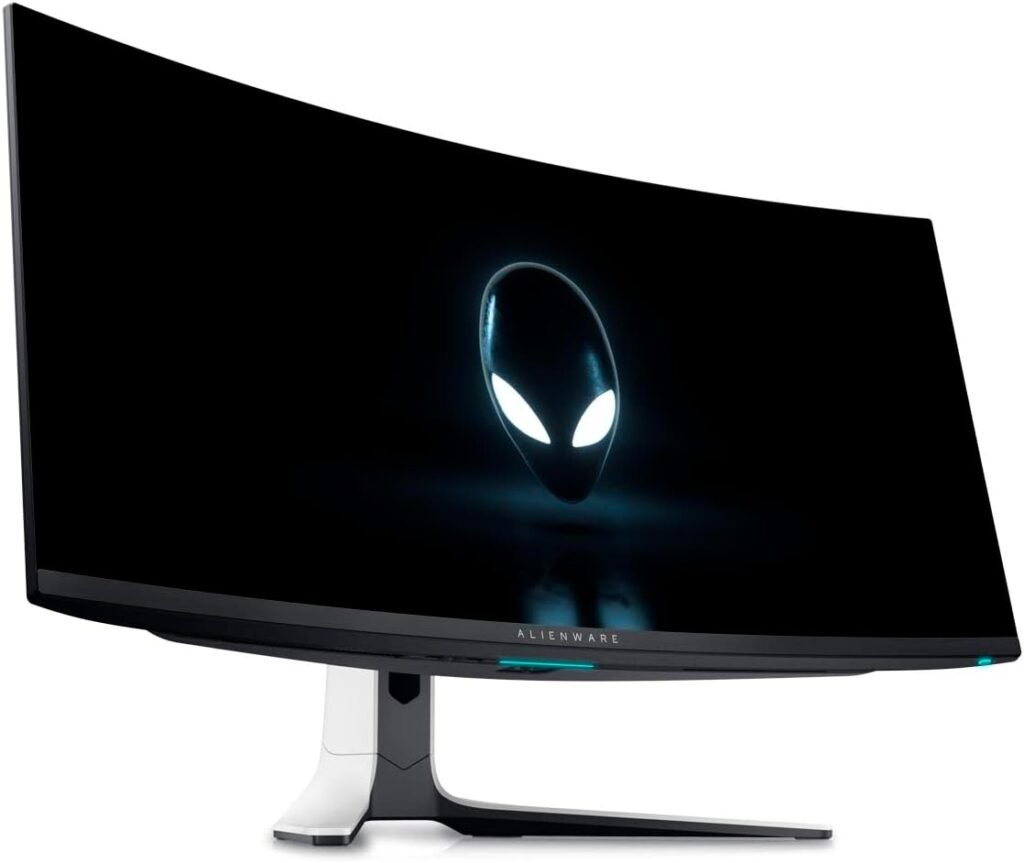
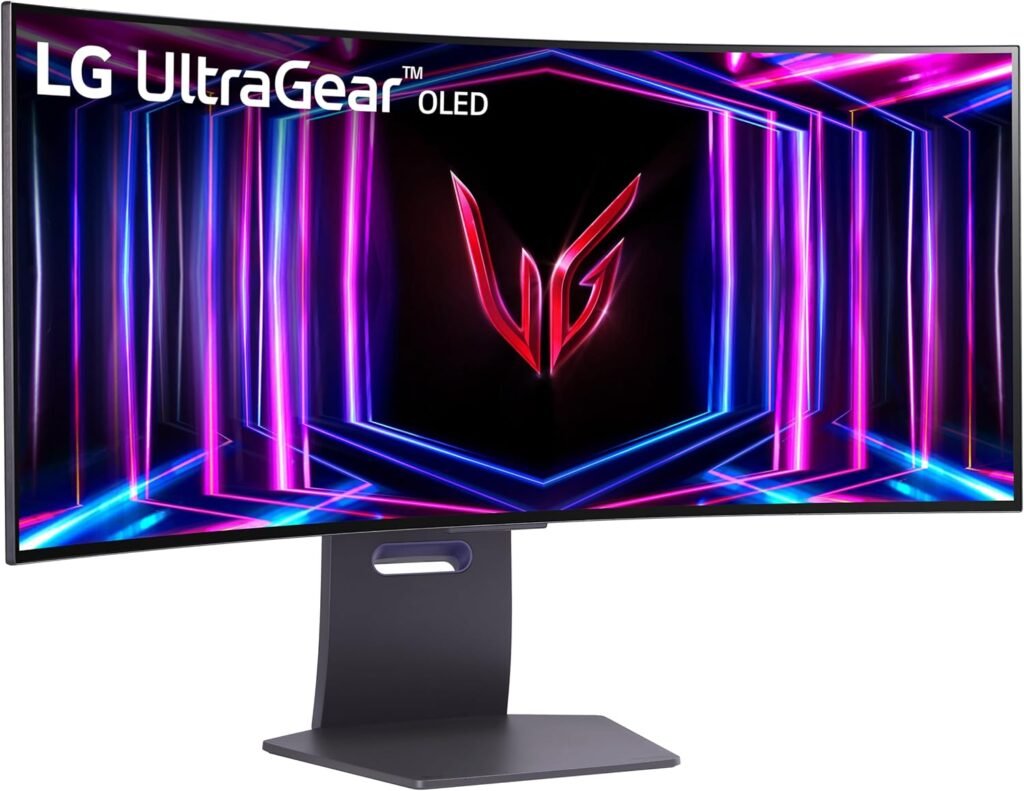
Where to Buy
✅ Check Price — Alienware AW3423DWF ✅ Check Price — LG 34GS95QEAlienware AW3423DWF vs LG 34GS95QE
At‑a‑glance
LG 34GS95QE: 240 Hz + tight 800R curve → better for esports‑leaning play & maximum smoothness.
AW3423DWF: QD‑OLED strengths + 165 Hz → stellar HDR gaming & color pop; different text rendering trade‑offs.
Key Differences (1-Minute Read)
- Refresh Rate: Alienware AW3423DWF at 165Hz vs LG 34GS95QE at 240Hz.
- Curvature: Alienware uses 1800R; LG goes tighter with 800R.
- Panel Tech: Alienware’s QD-OLED for vibrant HDR vs LG’s OLED for pure contrast.
- Response Time: 0.1ms (Alienware) vs 0.03ms (LG) — esports-grade speed.
- Connectivity: Alienware: HDMI 2.0 + DP 1.4; LG: HDMI 2.1 + USB-C for next-gen devices.
- Best Fit: Alienware for cinematic HDR and color pop; LG for maximum speed & competitive play.
LG 34GS95QE vs Alienware AW3423DWF: Price & Value Comparison
Detail comparison for Alienware AW3423DWF and LG 34GS95QE
| Feature | Alienware AW3423DWF | LG 34GS95QE |
|---|---|---|
| Panel Technology | Quantum Dot OLED | OLED |
| Screen Size | 34 inches | 34 inches |
| Screen Curvature | 1800R | 800R |
| Resolution | 3440×1440 WQHD | 3440×1440 WQHD |
| Refresh Rate | 165Hz with AMD FreeSync Premium Pro | 240Hz with NVIDIA G-SYNC and AMD FreeSync |
| Response Time | 0.1ms | 0.03ms |
| HDR Certification | DisplayHDR 400 True Black | DisplayHDR True Black 400 |
| Contrast Ratio | Deep blacks with QD-OLED color depth | 1.5M:1, superior contrast with OLED tech |
| Color Depth | 1.07 billion colors | 1.07 billion colors |
| Brightness | Optimal brightness levels with HDR support | DisplayHDR with HDR True Black support |
| Ports | HDMI 2.0, DisplayPort 1.4, USB 3.2, headphone out | HDMI 2.1, DisplayPort, USB-C |
| Adjustability | Height, swivel, tilt adjustments | Height, tilt, and pivot adjustments |
| Gaming Features | AlienFX customizable lighting | Advanced adaptive sync, fast refresh |
| Adaptive Sync | AMD FreeSync Premium Pro | NVIDIA G-SYNC, AMD FreeSync Premium Pro |
| Design | Alienware signature design with RGB lighting | Sleek UltraGear design |
| Price | Mid-high price range, generally more economical | Higher-end pricing, premium for performance |
| Best Fit For | Immersive gaming and color accuracy | Competitive gaming with ultra-fast response |
This table provides a clear breakdown to help users choose based on their unique preferences, such as performance, design, or compatibility with their gaming setup.
Alienware AW3423DWF vs LG 34GS95QE: Screen Quality Battle
Alienware AW3423DWF: An Immersive Gaming Legacy
Dell’s Alienware line has long been synonymous with premium gaming hardware. The Alienware AW3423DWF is designed to cater to serious gamers who prioritize fast response times and deep contrast levels in a curved display. It boasts Alienware’s Quantum Dot OLED technology, allowing it to deliver ultra-smooth gameplay with vibrant color accuracy. This monitor seeks to provide an edge in both gaming and multimedia experiences, combining Alienware’s reputation for durability and cutting-edge features.
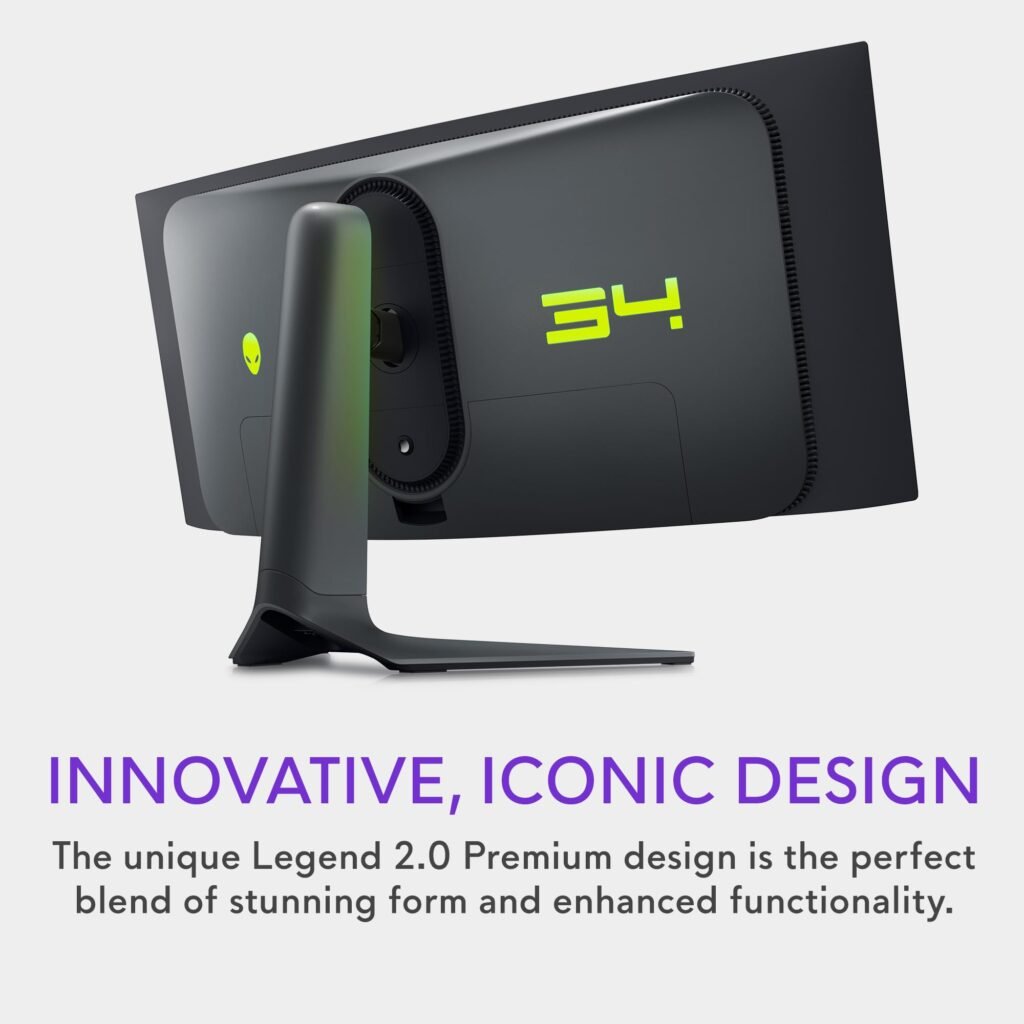
Primary Features:
- Screen Size: 34 inches with a curved QD-OLED panel
- Resolution: 3440×1440 WQHD
- Refresh Rate: 165Hz with AMD FreeSync Premium Pro
- Response Time: 0.1ms, designed for minimal input lag
- HDR Performance: DisplayHDR 400 True Black certification
- Connectivity: HDMI 2.0, DisplayPort 1.4, USB 3.2, and headphone out
- Adjustability: Offers height, tilt, and swivel adjustments for ergonomic comfort
Related: Best Surge Protector Power Strips
LG 34GS95QE: A Visionary Gaming Monitor
LG is a prominent player in the display technology industry, renowned for its innovation in OLED and gaming monitors. The LG 34GS95QE combines a high refresh rate with an 800R curved OLED display for immersive, lag-free gaming. This model, part of LG’s UltraGear lineup, targets gamers who want superior speed and contrast levels while minimizing screen tearing. The 34GS95QE’s unique features make it an ideal choice for gamers who value both speed and clarity.
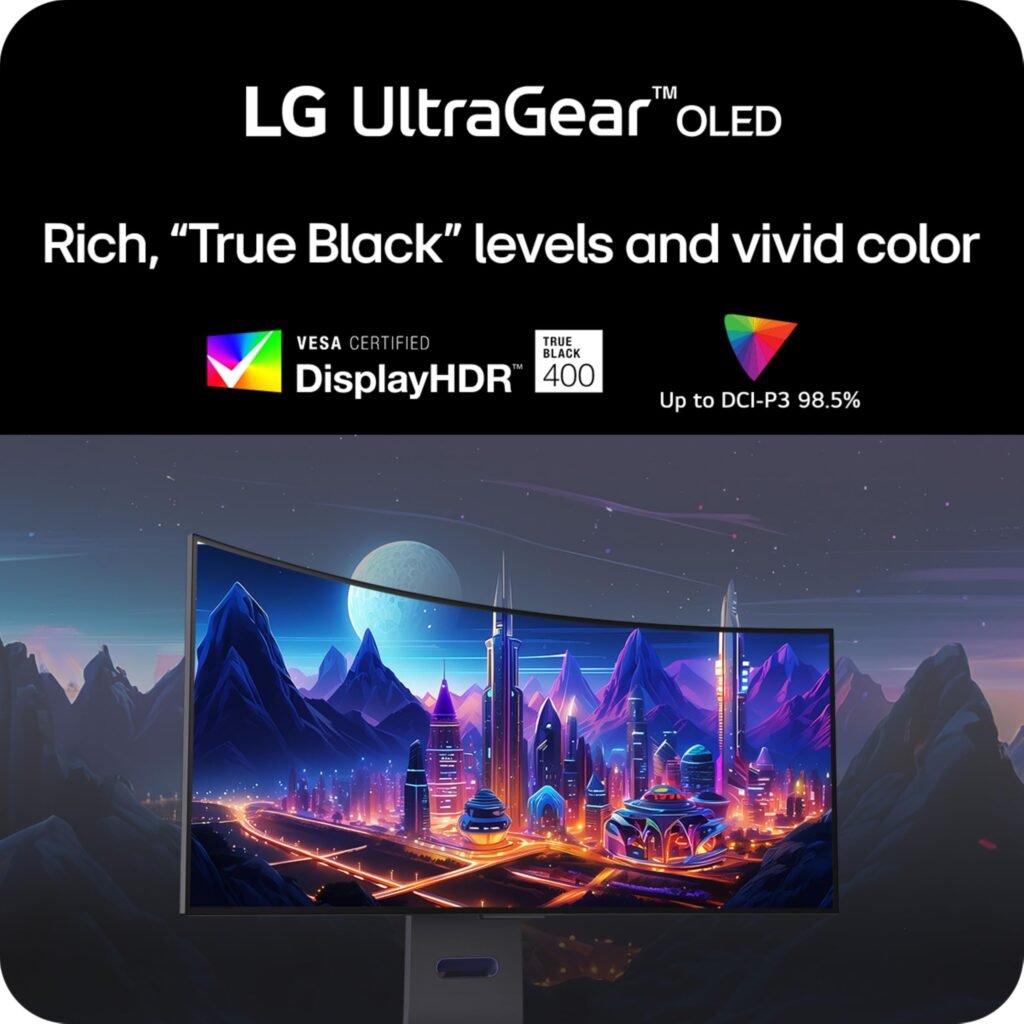
Primary Features:
- Screen Size: 34 inches with a curved OLED panel
- Resolution: 3440×1440 WQHD
- Refresh Rate: 240Hz, featuring NVIDIA G-SYNC and AMD FreeSync Premium Pro
- Response Time: 0.03ms, among the fastest in OLED technology
- HDR Performance: DisplayHDR True Black 400 certification
- Connectivity: DisplayPort, HDMI 2.1, and additional ports for versatility
- Adjustability: Supports height, tilt, and pivot adjustments
Pros And Cons
LG 34GS95QE vs Alienware AW3423DWF
| Feature | Alienware AW3423DWF | LG 34GS95QE |
|---|---|---|
| Panel Technology | ✅ QD-OLED – superior HDR brightness and color pop, especially in HDR titles. ❌ Text clarity can be affected by sub-pixel layout (fringing in office apps). | ✅ WOLED / OLED – delivers purer blacks and better text clarity. ❌ Slightly less HDR brightness compared to QD-OLED. |
| Screen Curvature | ✅ 1800R – gentle curve, comfortable for gaming and productivity. ❌ Less wraparound feel vs 800R. | ✅ 800R – extremely immersive for gaming and movies. ❌ Steep curve can distort straight lines for work tasks; adjustment needed. |
| Refresh Rate | ✅ 165 Hz – very smooth for most AAA titles. ❌ Lower ceiling; competitive gamers may prefer higher. | ✅ 240 Hz – esports-grade, great for shooters (e.g., Valorant, CS2). ❌ Many users with GPUs under 200 fps won’t fully benefit. |
| Response Time | ✅ 0.1 ms – already near-instant. ❌ Marginally slower than LG. | ✅ 0.03 ms – industry-leading, almost no ghosting. ❌ Real-world difference over 0.1 ms is negligible for non-pros. |
| HDR Certification | ✅ DisplayHDR 400 True Black – deep blacks, excellent for HDR gaming. ❌ Peak brightness a bit lower than LG in highlights. | ✅ HDR True Black 400 – strong HDR with consistent highlights. ❌ Can dim slightly during sustained bright scenes. |
| Adaptive Sync | ✅ FreeSync Premium Pro – smooth for AMD/console users. ❌ No official G-SYNC certification. | ✅ G-SYNC + FreeSync – best of both worlds. ❌ Some setups need calibration to avoid flicker. |
| Connectivity | ✅ HDMI 2.0 + DP 1.4 – works well with PC GPUs. ❌ No HDMI 2.1 → limits PS5/Series X 120Hz support. | ✅ HDMI 2.1 + USB-C – fully future-proof. ❌ Older GPUs/consoles may need adapters. |
| Ergonomics | ✅ Height, tilt, swivel – versatile. ❌ Lacks pivot (portrait mode). | ✅ Height, tilt, pivot – ideal for multi-use setups. ❌ Bulkier stand footprint. |
| Price | ✅ Usually $100–200 cheaper. ❌ Still premium tier. | ✅ Justified by performance at top-end. ❌ Higher price (~$200 more). |
| Design & Extras | ✅ AlienFX RGB lighting adds personality. ❌ May feel gamer-centric in workspaces. | ✅ Minimal UltraGear look – sleek and modern. ❌ No RGB/customizable accents. |
This pros and cons table provides a quick reference for comparing the strengths and weaknesses of each monitor.
Performance and Specifications of Alienware aw3423dwf vs LG 34gs95qe
Screen Quality and Refresh Rate
Independent testing shows that at 240Hz, the LG 34GS95QE can display up to 45% more frames per second than the Alienware’s 165Hz cap — a difference most noticeable in esports shooters where frame timing matters.
The Alienware’s QD-OLED panel, however, consistently measures brighter HDR highlights (peaks around 1000 nits) than the LG, making it stand out in HDR titles like Cyberpunk 2077 or Horizon Forbidden West.
Connectivity and Compatibility
For console players, the lack of HDMI 2.1 on the Alienware means it cannot deliver 120Hz gameplay at 1440p on PS5 or Xbox Series X, while the LG handles this natively.
The addition of USB-C on the LG also makes it a practical choice for creators who connect laptops or docking stations — a feature missing on the Alienware.
User Experience / Comfort and Ease of Use
Reviewers note that the Alienware’s gentler 1800R curve feels more natural for spreadsheets and browsing, while the LG’s aggressive 800R curve maximizes immersion in racing sims but can feel distorted in productivity apps.
The Alienware’s RGB AlienFX lighting adds atmosphere but has little impact on performance, while the LG’s streamlined OSD wins praise for faster in-game adjustments during competitive play.
Related: Dell Precision vs Alienware Desktop
Cost Summary
In most regions, retail listings show the Alienware priced at $100–$200 less, though LG’s pricing often includes HDMI 2.1 and pivot support that Alienware lacks.
Customer Reviews & Testimonials
Several buyers highlight text clarity issues in office apps on the Alienware due to its QD-OLED subpixel layout — something the LG avoids with its WOLED design.
Competitive gamers repeatedly mention the 240Hz upgrade as a tangible edge in reaction-based titles, though casual players may not notice a major leap over 165Hz.
Both monitors deliver a 3440×1440 resolution, offering gamers an expansive field of view. The Alienware AW3423DWF’s QD-OLED panel is optimized for vibrant color accuracy, producing rich visuals with deep blacks and a contrast ratio suited for HDR content. The LG 34GS95QE, on the other hand, features an OLED display known for superior contrast levels, complemented by a higher 240Hz refresh rate, ideal for fast-paced gaming where every millisecond matters.
| Feature | Alienware AW3423DWF | LG 34GS95QE |
|---|---|---|
| Panel Technology | QD-OLED | OLED |
| Screen Curvature | 1800R | 800R |
| Refresh Rate | 165Hz with FreeSync Premium Pro | 240Hz with FreeSync Premium Pro and G-SYNC |
| Response Time | 0.1ms | 0.03ms |
| HDR Certification | DisplayHDR 400 True Black | DisplayHDR True Black 400 |
The Alienware AW3423DWF’s QD-OLED technology delivers slightly enhanced color depth, making it an excellent choice for users who also work with color-sensitive content. The LG 34GS95QE’s OLED display, however, excels in speed and contrast, making it more suitable for competitive gamers who need ultra-fast refresh rates and minimal response times.
Connectivity and Compatibility
The Alienware AW3423DWF includes HDMI 2.0 and DisplayPort 1.4 connections, which should work well with most modern gaming systems but might limit future-proofing capabilities, especially for those eyeing HDMI 2.1. The LG 34GS95QE, equipped with HDMI 2.1, allows users to connect high-end consoles or computers without compromising refresh rates, making it a bit more versatile in terms of compatibility with next-generation devices.
User Experience
Comfort and Ease of Use
Gamers need to be comfy. Both monitors help reduce tiredness during long play. You can adjust the Alienware AW3423DWF up and down. You can also turn it left or right. You can tilt it forward or back. The LG 34GS95QE lets you do all those things too. Plus, you can spin it around. This spin is handy if you game and work on the same screen.
Menus and Settings
Both monitors have easy menus. You can change settings quickly. The Alienware menu has special colored lights. You can match these lights to game events. The LG menu is simpler. It lets you change brightness, contrast, and game modes fast. Some people like the Alienware lights. Others prefer the LG’s simple menu.
Price and Worth
Both monitors cost a lot. The Alienware usually costs less than the LG. This makes Alienware better for tight budgets. The LG costs more for good reasons. It has a faster screen. It works better with more things. It has more features for fast, flexible gaming.
Cost Summary:
| Feature | Alienware AW3423DWF | LG 34GS95QE |
|---|---|---|
| Estimated Price | Slightly lower ($100-$200 difference) | Premium pricing |
| Notable Extras | AlienFX lighting, more economical | Pivot adjustment, HDMI 2.1 |
| Cost-Effectiveness | High for immersive gaming | Very high for competitive gaming |
Customer Reviews and Testimonials
Customer reviews reveal key insights into each monitor’s strengths and weaknesses, often highlighting aspects like build quality, performance, and value.
Alienware AW3423DWF Feedback
Users appreciate the Alienware AW3423DWF’s QD-OLED technology, noting its vibrant colors and deep blacks. Many praise its easy setup and adjustable stand, ideal for marathon gaming sessions. However, some users feel that its refresh rate could be higher given the competition, and a few noted occasional issues with compatibility with certain gaming consoles.
“The colors are stunning, and it’s perfect for immersive gaming. The 165Hz refresh rate is solid, but a little more would be great for competitive games.” – Verified Buyer
LG 34GS95QE Feedback
The LG 34GS95QE has gained a loyal following among competitive gamers. Reviews often highlight its ultra-fast response time and smooth gameplay experience at 240Hz, which makes it ideal for esports titles. Some users, however, have mentioned that the steeper curvature takes some time to adjust to, and the higher price tag can be a drawback for budget-conscious shoppers.
“Incredibly smooth and fast. I love the 240Hz for my favorite FPS games, but it’s definitely an investment.” – Verified Buyer
Related: MSI MAG 271QPX vs Alienware AW2725DF
Best Fit Scenarios
When to Choose the Alienware AW3423DWF
Pick the Alienware AW3423DWF if you love games that feel real. It shows great colors. You will like its fun lights you can change. Choose it if you want a comfy screen that looks great. It works well for bright, colorful games.
When to Choose the LG 34GS95QE
Pick the LG 34GS95QE if you play to win. It has a super fast screen. It stops tearing in games. This is perfect for fast games like shooting. If you play a lot of action games, its speed helps you play better.
Frequently Asked Questions (FAQ)
Is 800R too curved for everyday work?
The LG 34GS95QE’s 800R curve is more aggressive than most monitors. It creates strong immersion for gaming, but some users may find text and spreadsheets stretched at the edges. For pure office tasks, a gentler 1800R curve like on the Alienware AW3423DWF may feel more natural.
Does 240Hz on the LG 34GS95QE matter if I cap at 120fps?
Even if you don’t always hit 240fps, the 240Hz panel reduces input lag and frame-to-frame blur. Competitive gamers benefit most, but casual players may not notice a big jump over 165Hz unless they play at very high frame rates.
Is the Alienware AW3423DWF’s 165Hz enough for competitive shooters?
Yes. At 165Hz with QD-OLED, the AW3423DWF still delivers smooth motion and very low response times (0.1ms). While not as fast as 240Hz, it’s more than sufficient for most gamers outside of high-level esports play.
Which panel type handles text better for office use?
Traditional OLED (like the LG) can sometimes render small text more cleanly, while QD-OLED panels (Alienware) may show slight fringing due to subpixel layouts. For heavy office or coding work, this is worth considering, though many gamers don’t notice it.
Does HDMI 2.1 on the LG 34GS95QE benefit PS5 or Xbox Series X?
Yes. HDMI 2.1 ensures consoles can output at high refresh rates without bandwidth bottlenecks. The Alienware’s HDMI 2.0 may limit console users to lower refresh rates or require DisplayPort for PC gaming.
Conclusion and Recommendation
In the battle of Alienware AW3423DWF vs LG 34GS95QE, both monitors excel in unique ways:
- Choose the Alienware AW3423DWF if you are looking for a balanced, immersive experience with rich colors, superior ergonomics, and a design focused on overall gaming enjoyment.
- Opt for the LG 34GS95QE if you are a competitive gamer needing high refresh rates, minimal response time, and adaptive sync technology for smooth, tear-free gameplay.
Ultimately, selecting between these two monitors depends on personal priorities: color depth and design for the Alienware, versus speed and advanced gaming support for the LG model. Either way, both monitors represent the pinnacle of gaming display technology, ensuring that whichever you choose, you’ll enjoy a truly enhanced gaming experience.
Choosing a gaming monitor can dramatically impact your gaming experience. By evaluating your needs and budget carefully, you’ll be well-prepared to make the right choice. Happy gaming!
Related Keywords: alienware aw3423dwf vs lg 34gs95qe, alienware vs inspiron, which alienware monitor is the best, alienware aw3423dwf vs, aw3423dw vs lg 34gp950g-b, aw3423dwf vs lg 27gr95qe, alienware aw3423dw vs aw3423dwf, aw3423dwf vs lg c2, dell alienware aw3423dw vs dell alienware aw3423dwf, dell alienware aw3423dwf vs aw3423dw, is alienware aw3423dw 4k, alienware aw3423dwf vs aw3423dw, u3423we vs u3421we, u3423we review, 3423dw vs 3423dwf, aw3423dwf vs, aw3423dwf vs g8, aw3423dwf vs g85sb, aw3423dwf vs samsung g8 oled.

